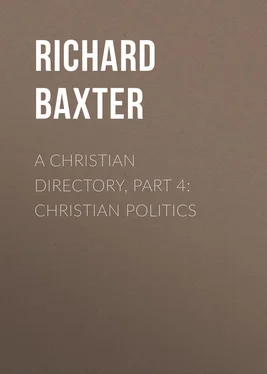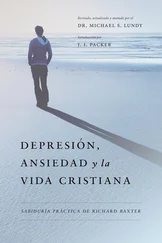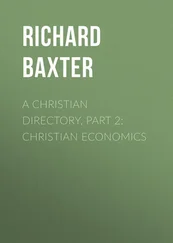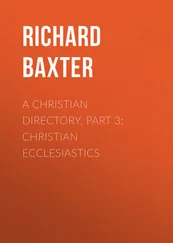Richard Baxter - A Christian Directory, Part 4 - Christian Politics
Здесь есть возможность читать онлайн «Richard Baxter - A Christian Directory, Part 4 - Christian Politics» — ознакомительный отрывок электронной книги совершенно бесплатно, а после прочтения отрывка купить полную версию. В некоторых случаях можно слушать аудио, скачать через торрент в формате fb2 и присутствует краткое содержание. Жанр: foreign_antique, foreign_prose, на английском языке. Описание произведения, (предисловие) а так же отзывы посетителей доступны на портале библиотеки ЛибКат.
- Название:A Christian Directory, Part 4: Christian Politics
- Автор:
- Жанр:
- Год:неизвестен
- ISBN:нет данных
- Рейтинг книги:3 / 5. Голосов: 1
-
Избранное:Добавить в избранное
- Отзывы:
-
Ваша оценка:
- 60
- 1
- 2
- 3
- 4
- 5
A Christian Directory, Part 4: Christian Politics: краткое содержание, описание и аннотация
Предлагаем к чтению аннотацию, описание, краткое содержание или предисловие (зависит от того, что написал сам автор книги «A Christian Directory, Part 4: Christian Politics»). Если вы не нашли необходимую информацию о книге — напишите в комментариях, мы постараемся отыскать её.
A Christian Directory, Part 4: Christian Politics — читать онлайн ознакомительный отрывок
Ниже представлен текст книги, разбитый по страницам. Система сохранения места последней прочитанной страницы, позволяет с удобством читать онлайн бесплатно книгу «A Christian Directory, Part 4: Christian Politics», без необходимости каждый раз заново искать на чём Вы остановились. Поставьте закладку, и сможете в любой момент перейти на страницу, на которой закончили чтение.
Интервал:
Закладка:
No doubt but the king is the supreme governor over all the schools, and physicians, and hospitals in the land, that is, he is the supreme in the civil coercive government: he is supreme magistrate over divines, physicians, and schoolmasters; but not the supreme divine, physician, or schoolmaster. When there is any work for the office of the magistrate, that is, for the sword, among any of them, it belongeth only to him, and not at all to them: but when there is any work for the divine, the physician, the schoolmaster, or if you will, for the shoemaker, the tailor, the watchmaker, this belongeth not to the king to do, or give particular commands for: but yet it is all to be done under his government; and on special causes he may make laws to force them all to do their several works aright, and to restrain them from abuses. As (to clear the case in hand) the king is informed that physicians take too great fees of their patients, that some through ignorance, and some through covetousness, give ill compounded medicines and pernicious drugs: no doubt but the king, by the advice of understanding men, may forbid the use of such drugs as are found pernicious to his subjects, and may regulate not only the fees, but the compositions and attendances of physicians. But if he should command, that a man in a fever, or dropsy, or consumption, shall have no medicine, but this or that, and so oft, and in such or such a dose, and with such or such a diet; and the physicians, whom my reason bindeth me to trust, (and perhaps my own experience also,) do tell me that all these things are bad for me, and different tempers and accidents require different remedies, and that I am like to die, or hazard my health, if I obey not them contrary to the king's commands, here I should rather obey my physicians: partly, because else I should sin against God, who commandeth me the preservation of my life; and partly, because this matter more belongeth to the physician, than to the magistrate. Mr. Richard Hooker, Eccles. Polit. lib. viii. p. 223, 224, giveth you the reason more fully. 73
Direct. XXV. Give not the magistrate's power to any other; whether to the people, on pretence of their majestatis realis , (as they call it,) or the pope, or prelates, or pastors of the church, upon pretence of authority from Christ, or of the distinction of ecclesiastical government and civil. The people's pretensions to natural authority, or real majesty, or collation of power, I have confuted before, and more elsewhere. The pope's, prelate's, and pastor's power of the sword in causes ecclesiastical, is disproved so fully by Bishop Bilson ubi supra , and many more, that it is needless to say much more of it. 74All protestants, so far as I know, are agreed that no bishop or pastor hath any power of the sword, that is, of coercion, or force upon men's bodies, liberties, or estates, except as magistrates derived from their sovereign. Their spiritual power is only upon consenters, in the use of God's word upon the conscience, either generally in preaching, or with personal application in discipline. No courts or commands can compel any to appear or submit, nor lay the mulct of a penny upon any, but by their own consent, or the magistrate's authority. But this the papists will few of them confess: for if once the sword were taken from them, the world would quickly see that their church had the hearts of few of those multitudes, whom by fire and sword they forced to seem their members; or at least, that, when the windows were opened, the light would quickly deliver poor souls from the servitude of those men of darkness. For then few would fear the unrighteous excommunication of mere usurpers. 75It is a manifold usurpation by which their kingdom is upheld. (For a kingdom it is rather to be called than a church.) 1. They usurp the power of the keys or ecclesiastical government over all the world, and make themselves pastors of those churches, which they have nothing to do to govern. Their excommunications of princes or people, in other lands or churches that never took them for their pastors, is a usurpation the more odious, by how much the power usurped is more holy, and the performance in so large a parish as the whole world, is naturally impossible to the Roman usurper. 2. Under the name of ecclesiastical jurisdiction, they usurp the magistrate's coercive power in such causes as they call ecclesiastical. 3. Yea, and they claim an immunity to their clergy from the civil government, as if they were no subjects of the king, or the king had not power to punish his offending subjects. 4. In ordine ad spiritualia , they claim yet more of the magistrate's power. 5. And one part of them give the pope directly in temporals a power over kings and kingdoms. 6. Their most eminent divines do ordinarily maintain, that the pope may excommunicate kings and interdict kingdoms, and that an excommunicated king is no king, and may be killed. It is an article of their religion, determined of in one of their approved general councils, (Later. sub. Innoc. III. can. 3,) That if temporal lords will not exterminate heretics from their lands, (such as the Albigenses, that denied transubstantiation, mentioned can. 2,) the pope may give their dominions to others, and absolve their vassals from their fealty. And when some of late would have so far salved their honour, as to invalidate the authority of that council, they will not endure it, but have strenuously vindicated it; and indeed whatever it be to us, with them it is already enrolled among the approved general councils. Between the Erastians, who would have no government but by magistrates, and papists, who give the magistrate's power to the pope and his prelates, the truth is in the middle; that the pastors have a nunciative and directive power from Christ, and a discipline to exercise by the word alone, or volunteers; much like the power of a philosopher in his school, or a physician in his hospital, supposing them to be by divine right.
Direct. XXVI. Refuse not to swear allegiance to your lawful sovereign. Though oaths are fearful, and not to be taken without weighty cause, yet are they not to be refused when the cause is weighty, as here it is. Must the sovereign be sworn to do his office for you, and must he undertake so hard and perilous a charge for you, which he is no way able to go through, if his subjects be not faithful to him? And shall those subjects refuse to promise and swear fidelity? This is against all reason and equity.
Direct. XXVII. Think not that either the pope, or any power in the world, can dispense with this your oath, or absolve you from the bond of it, or save you from the punishment due from God, to the perjured and perfidious. Of this see what I have written before against perjury.
Direct. XXVIII. Do nothing that tendeth to bring the sacred bonds of oaths into an irreligious contempt, or to make men take the horrid crime of perjury to be a little sin. Sovereigns have no sufficient security of the fidelity of their subjects, or of their lives, or kingdoms; if once oaths and covenants be made light of, and men can play fast and loose with the bonds of God, which lie upon them. He is virtually a traitor to princes and states, who would bring perjury and perfidiousness into credit, and teacheth men to violate oaths and vows. For there is no keeping up human societies and governments, where there is no trust to be put in one another. And there is no trust to be put in that man, that maketh no conscience of an oath or vow. 76
Direct. XXIX. Be ready to your power to defend your governors, against all treasons, conspiracies, and rebellions. 77For this is a great part of the duty of your relation. The wisdom and goodness necessary to government, is much personal in the governors themselves; but the strength (without which laws cannot be executed, nor the people preserved) is in the people, and the prince's interest in them; therefore if you withdraw your help in time of need, you desert and betray your rulers, whom you should defend. If you say, it is they that are your protectors. I answer, true; but by yourselves. They protect you by wisdom, council, and authority, and you must protect them by obedience and strength. Would you have them protect you rather by mercenaries or foreigners? If not, you must be willing to do your parts, and not think it enough in treasons, invasions, or rebellions, to sit still and save yourselves, and let him that can lay hold on the crown, possess it. What prince would be the governor of a people, that he knew would forsake him in his need?
Читать дальшеИнтервал:
Закладка:
Похожие книги на «A Christian Directory, Part 4: Christian Politics»
Представляем Вашему вниманию похожие книги на «A Christian Directory, Part 4: Christian Politics» списком для выбора. Мы отобрали схожую по названию и смыслу литературу в надежде предоставить читателям больше вариантов отыскать новые, интересные, ещё непрочитанные произведения.
Обсуждение, отзывы о книге «A Christian Directory, Part 4: Christian Politics» и просто собственные мнения читателей. Оставьте ваши комментарии, напишите, что Вы думаете о произведении, его смысле или главных героях. Укажите что конкретно понравилось, а что нет, и почему Вы так считаете.












